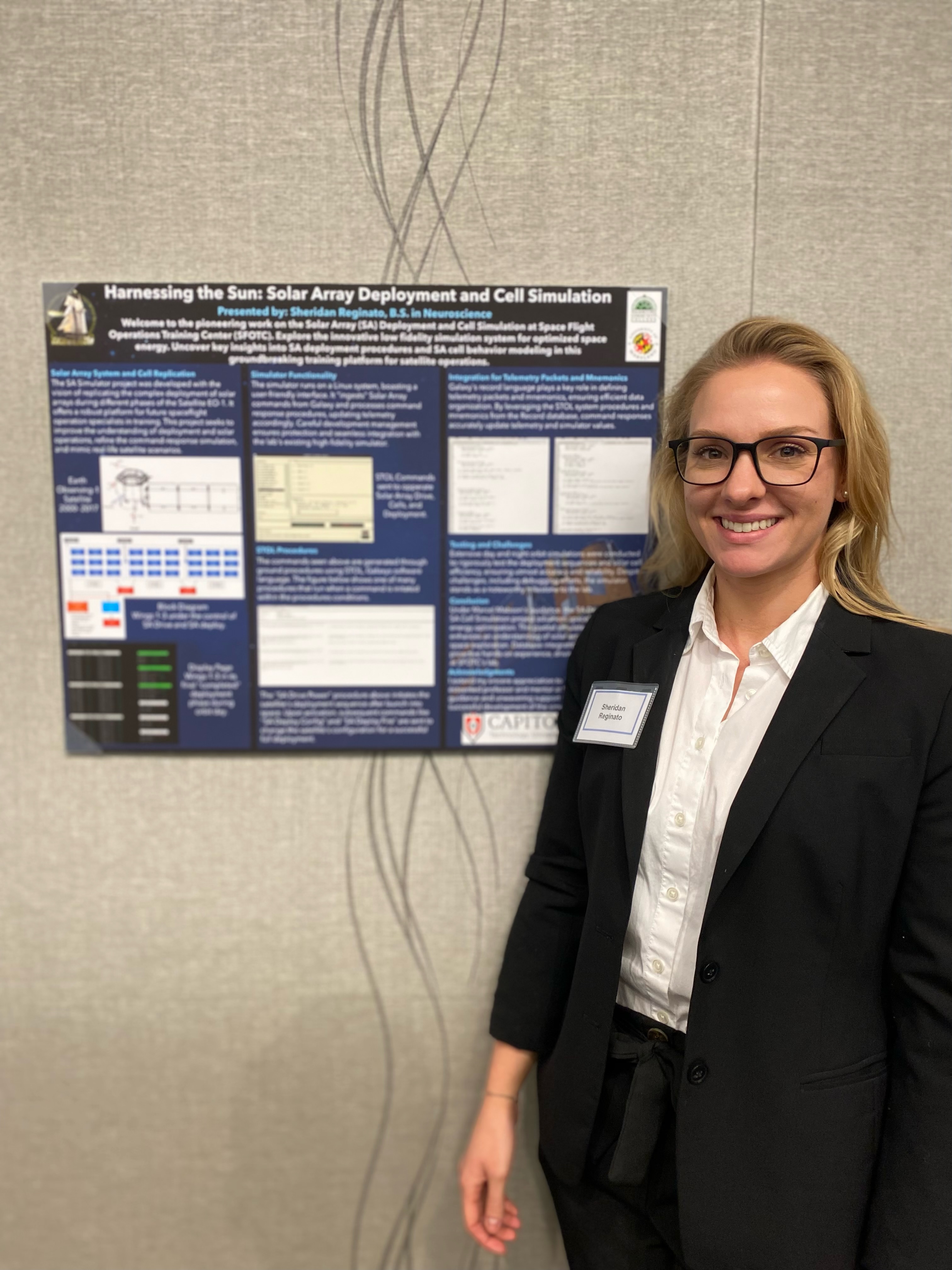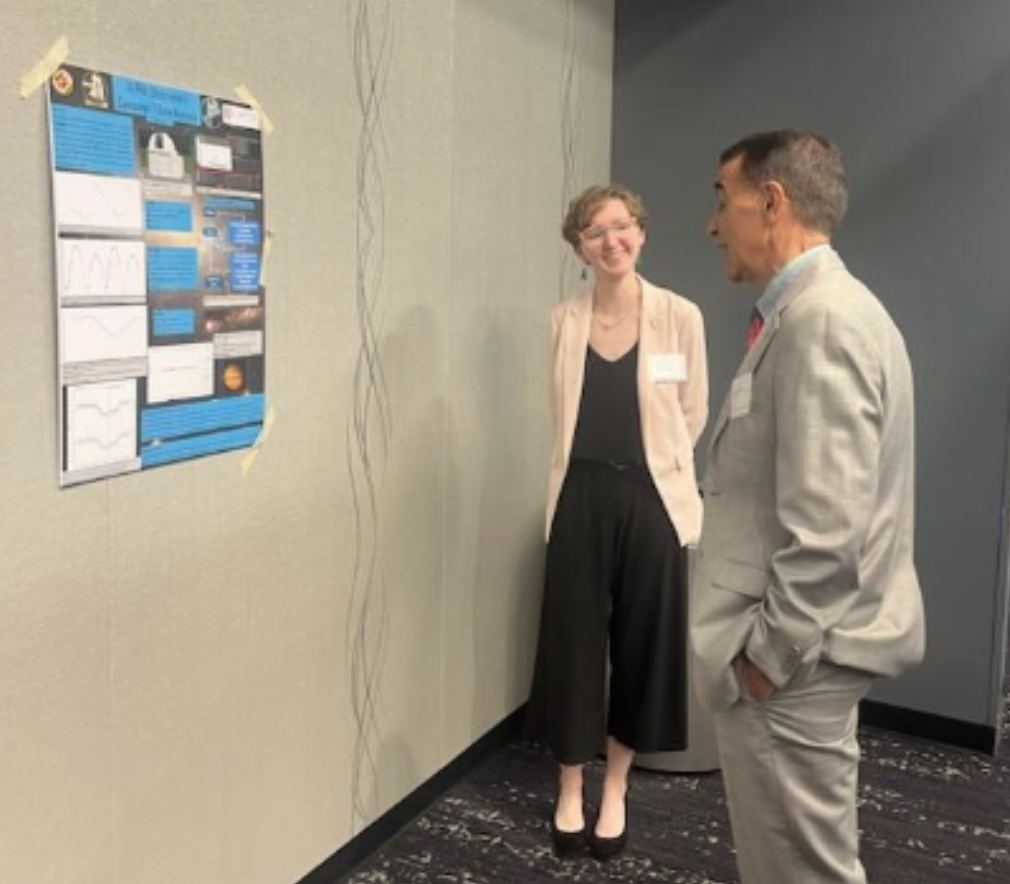At Capitol Technology University, we provide opportunities for students to join us during the summer and experience the opportunities and unique resources we have to offer. This is made possible through the collaboration of participating universities under the Maryland Space Grant Consortium (MDSGC) Summer Exchange Internship Program.
This past summer, we had the pleasure of hosting two summer interns to perform research within our Astronautical Engineering Program: Sheridan Reginato, from the University System of Maryland (Hagerstown), who worked in our Space Flight Operations Training Center (SFTOC) and Meredith Embrey from the University of Maryland (College Park), who worked with our ALPHA Observatory. Their internships spanned the course of 10-weeks, culminating in a presentation of their scientific research at Johns Hopkins University.
We checked in with them after their internship to see how it went. Read their interviews below:
MDSGC 2023 Intern Interview: Sheridan Reginato
1. How did you hear about the internship program at Capitol Tech? What made you interested in joining?
I learned about the internship program at Capitol Tech from my engineering course at Hagerstown Community College, where Professor Eric Sigler mentioned the Maryland Space Grant summer internships. Among the various internship options, I was immediately drawn to the program's focus on space missions and operations, aligning perfectly with my passion for Human Factors, engineering, and technology. The opportunity to gain hands-on experience in satellite operations and contribute to space exploration further fueled my interest in joining the program.
2. What is your major at your college?
My major at the University of Maryland, College Park, was neuroscience. I graduated in May of 2022.
3. What kind of work did you do in the SFOTC?
During my 10-week internship at the Space Flight Operations Training Center (SFOTC), I was involved in developing a satellite simulation for training spaceflight operation students. The simulation focused on solar array deployment and solar cell simulation, emulating real-life scenarios and helping students gain invaluable hands-on experience in satellite operations.
4. Did you work/research collaboratively with your fellow intern, or was all of your work done independently?
I worked independently on the project under the close guidance of Professor Marcel Mabson. While the nature of the satellite simulation development required individual focus and dedication, Professor Mabson provided invaluable support and mentorship, guiding me along the way. His expertise in space missions and operations proved instrumental in shaping my understanding and refining the project's direction.
5. What are your career goals, and how did working in the SFOTC help you get closer to those goals?
This transformative internship experience has ignited a deep passion for aerospace, engineering, and technology. It has undoubtedly shaped my career aspirations and propelled me towards pursuing the Spaceflight Operations Certificate at Capitol Technology University. While the connection between neuroscience and spaceflight operations engineering may not be immediately apparent, the combination of these fields yields valuable contributions to the advancement of space exploration and the successful execution of complex space missions.
6. What was the most challenging part of your work on the SFOTC? What was your favorite part of your work?
The most challenging part of my work was troubleshooting and debugging the satellite simulation. Being new to programming, with only a gentle introduction to Python from a previous class, I faced additional hurdles. However, the experience allowed me to expand my technical skills and witness the final simulation in action, making it a rewarding and fulfilling moment. My favorite part of the work was witnessing the final simulation in action. Seeing our collective efforts come to life and knowing that it would be used for training future spaceflight operations students was incredibly rewarding.
7. How will you use what you have learned at your Capitol internship to help your studies back at your home college?
It has undoubtedly shaped my career aspirations and propelled me towards pursuing the Spaceflight Operations Certificate here at Capitol Technology University!
8. Did you make any particularly interesting/significant discoveries during your internship?
During my internship, I made interesting discoveries about the intricacies of satellite behavior and solar array deployment. Understanding how interconnected systems work in space missions and the challenges of real-time operations provided valuable insights into the complexities of space exploration.
9. How do you feel that your understanding of the material changed before and after working in the SFOTC?
Before working in the SFOTC, I had theoretical knowledge of neuroscience and a general interest in aerospace, particularly in aerospace physiology, and aviation human factors. However, after the internship, my understanding of the material expanded significantly. I gained practical insights into space missions, satellite operations, and their impact on space exploration. This experience deepened my passion for aerospace technology and operations.
10. What was your main research topic/subject of your final presentation?
My main research topic for the final presentation was "Harnessing the Sun: Solar Array Deployment and Solar Cell Simulation." The focus lies on developing a satellite simulation to train spaceflight operations students attending Capitol Tech University, closely emulating real-life scenarios. The simulation replicates a segment of satellite EO-1, where solar array wings are controlled by the SA Drive and SA Deployment. Operating as an interconnected network, the system comprises multiple languages in Galaxy. Initiating one command sets off a cascade of interrelated procedures, utilizing database mnemonics to establish a continuous information exchange loop that is systematically updated on the display page. Throughout orbital cycles, testing involves tackling challenges related to debugging and error configuration. The simulation's success grants invaluable hands-on experience in satellite operations, significantly advancing our comprehension of solar array behavior and energy management in space.
11. Please include anything else that you would like to share about your experience.
Participating in the SFOTC internship was a truly transformative experience. It solidified my career aspirations in human factors, operations, and engineering, and I am deeply grateful for the opportunity to contribute to the exciting world of space missions and operations. The internship not only expanded my knowledge but also allowed me to work with passionate professionals in the field, fostering lasting connections and inspiring me to continue exploring the frontiers of space exploration. I look forward to applying the skills and experiences gained during the internship to contribute to the advancement of space exploration
MDSGC 2023 Intern Interview: Meredith Embrey
1. How did you hear about the internship program at Capitol Tech? What interested you in joining?
I heard about this internship through my faculty advisor at UMD, Dr. Bowden. What interested me was how different this internship was from the other options. I had never worked with an observatory before and found it intriguing.
2. What is your current major?
My major at UMDCP is Aerospace Engineering.
3. What kind of work did you do with ALPHA?
With ALPHA, I analyzed the last few months of observation data. I created light curves for variable stars and exoplanets while also submitting asteroid data to the Minor Planet Center (MPC).
4. Did you work or research collaboratively with your fellow intern, or Capitol students? Or was all of your work done independently?
My work was all done independently other than when I needed assistance or guidance from Professor Mabson, and he was very helpful and available.
5. What are your career goals and how did working with ALPHA help you get closer to those goals?
My career goals are to work with CubeSats and SmallSats at NASA or other space companies, and work hands-on with building hardware. Eventually, I’d like to use that knowledge to inspire young people to start a path in STEM. ALPHA helped me realize the broader use of what I wanted to do, and showed me the joy and nuances of processing the data. That data analysis helped me solidify my interest in satellites.
6. What was your favorite part of your work with ALPHA? What was the most challenging part of your work?
My favorite part of my work with ALPHA would have to be seeing the cleaned-up images from observations in comparison to what they were beforehand. The fact that I could now see the object in question quite clearly.
The most challenging part of my work was dealing with software issues involving some of the programs used for creating light curves and clarifying images.
7. How will you use what you have learned during your Capitol internship to help your studies back at UMDCP?
What I learned during my internship will help my data analysis and payload idea generation for the Balloon Payload Program back at University of Maryland College Park. Knowing the importance of and the length of time that data analysis can take.
8. Did you make any particularly interesting or significant discoveries during your internship?
Something significant I discovered during my internship is that ALPHA was one of the observations of exoplanet XO2NB before it was actually classified as an exoplanet. Which I find quite amazing and interesting.
9. How do you feel that your understanding of the material changed before and after working with ALPHA?
Through my internship with ALPHA, I understand more of how astronomy facilities function and have developed a new sense of awe at the entire process of doing an observation, now that I know all of the details that go into not just the planning, but the post-processing.
10. What was your main research topic of your final poster presentation at JHU?
My main subject for my final poster presentation was the light curves and data around the exoplanets and variable stars that ALPHA observed for the first time during this campaign. Some interesting details from that poster are how you can figure out the orbit of a pair of binary stars from a light curve, and the amount of data you can receive from comparing the observed data to that of other observations from other observatories.




